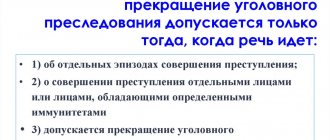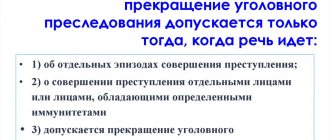Investigator Sidorov received a message from citizen Ivanov that his neighbor Vasily robbed a local grocery store. As evidence, Ivanov showed a video recording on his phone where Vasily discussed the process of a future robbery with his friend the day before the crime.
What will investigator Sidorov do? The answer is simple - check the information received. If the data is confirmed, then Sidorov will initiate a case - this is the first stage of the criminal process.
The investigator is given 3 days to check information about a committed or impending criminal offense and decide to initiate a case. The efficiency of further investigation depends on the efficiency of this process.
The actions of officials are not always legal. Often, the initiation of a case is accompanied by red tape and gross errors, which hinders the collection of evidence and the effective conduct of the investigation process.
To protect your rights, it is worth reading what grounds there may be for initiating a criminal case. And even if you are one hundred percent sure of your innocence, it is better to enlist the support of a lawyer.
Do you want to figure it out, but don’t have time to read the article? Lawyers will help
Entrust the task to professionals. Lawyers will complete the order at the cost you specify
25 lawyers on RTIGER.com can help with this issue
Solve the issue >
What reasons for initiating a case are specified in the law?
The reason for initiating a case is the sources of information about a crime (prepared or committed), which are legal facts. The investigator or inquiry officer is obliged to consider these facts and decide to initiate a criminal case if there are sufficient grounds.
According to Article 140 of the Code of Criminal Procedure, the following may be grounds for initiating a criminal case:
- confession;
- statement of a crime committed;
- the prosecutor's decision to forward the case materials to the preliminary investigation body to resolve issues of criminal prosecution;
- a message about a crime committed or being prepared.
They have the right to initiate a criminal case only if there is such a basis as the sufficiency of data indicating the signs of a crime.
Section VII. CRIMINAL PROCEEDINGS
RUSSIAN FEDERATION
CRIMINAL PROCEDURE CODE OF THE RUSSIAN FEDERATION
PART TWO. PRE-TRIAL PROCEEDINGS
Section VII. CRIMINAL PROCEEDINGS
Chapter 19. REASONS AND BASIS FOR INSTITUTION OF CRIMINAL PROCEEDINGS
Article 140. Reasons and grounds for initiating a criminal case
1. The reasons for initiating a criminal case are:
1) statement of a crime;
2) surrender;
3) a message about a crime committed or being prepared, received from other sources;
4) the prosecutor’s decision to forward the relevant materials to the preliminary investigation body to resolve the issue of criminal prosecution.
(Clause 4 introduced by Federal Law dated December 28, 2010 N 404-FZ)
2. The basis for initiating a criminal case is the presence of sufficient data indicating the signs of a crime.
Article 141. Statement of a crime
1. A statement about a crime can be made orally or in writing.
2. The written statement of the crime must be signed by the applicant.
3. An oral statement about a crime is entered into the protocol, which is signed by the applicant and the person who accepted this statement. The protocol must contain information about the applicant, as well as documents identifying the applicant.
4. If an oral report of a crime is made during an investigative action or during a trial, then it is entered, respectively, in the protocol of the investigative action or the protocol of the court session.
5. In the event that the applicant cannot be personally present when the protocol is drawn up, his application is drawn up in the manner established by Article 143 of this Code.
6. The applicant is warned of criminal liability for knowingly false denunciation in accordance with Article 306 of the Criminal Code of the Russian Federation, about which a note is made in the protocol, which is certified by the signature of the applicant.
7. An anonymous statement about a crime cannot serve as a reason to initiate a criminal case.
Article 142. Confession
1. A statement of confession is a voluntary report of a person about the crime he has committed.
2. A statement of confession can be made either in writing or orally. An oral statement is accepted and entered into the protocol in the manner established by part three of Article 141 of this Code.
Article 143. Report on detection of signs of a crime
A message about a crime committed or being prepared, received from sources other than those specified in Articles 141 and 142 of this Code, is accepted by the person who received this message, and a report on the discovery of signs of a crime is drawn up.
(as amended by Federal Law dated May 29, 2002 N 58-FZ)
Article 144. Procedure for considering a report of a crime
1. The inquiry officer, the inquiry body, the investigator, the head of the investigative body are obliged to accept, verify a message about any crime committed or being prepared and, within the competence established by this Code, make a decision on it no later than 3 days from the date of receipt of the specified message. When checking a report of a crime, the inquiry officer, the inquiry body, the investigator, the head of the investigative body has the right to demand documentary checks, audits, studies of documents, objects, corpses and to involve specialists in these checks, audits, studies, and to give the inquiry body a binding written order. on carrying out operational search activities.
(as amended by Federal Laws dated 03/09/2010 N 19-FZ, dated 12/28/2010 N 404-FZ)
2. Based on a report of a crime disseminated in the media, the inspection is carried out on behalf of the prosecutor by the inquiry body, as well as on the instructions of the head of the investigative body by the investigator. The editorial office and the editor-in-chief of the relevant mass media are obliged to hand over, at the request of the prosecutor, investigator or body of inquiry, the documents and materials at the disposal of the relevant mass media confirming the report of a crime, as well as information about the person who provided the specified information, except in cases where this the person set a condition to keep the source of information secret.
(as amended by Federal Law dated June 5, 2007 N 87-FZ)
3. The head of the investigative body, the head of the inquiry body has the right, at the motivated request of the investigator or interrogating officer, respectively, to extend the period established by part one of this article to 10 days. If it is necessary to carry out documentary checks, audits, studies of documents, objects, corpses, the head of the investigative body, at the request of the investigator, and the prosecutor, at the request of the investigator, has the right to extend this period to 30 days with a mandatory indication of the specific factual circumstances that served as the basis for such an extension.
(Part 3 as amended by Federal Law dated 03/09/2010 N 19-FZ)
4. The applicant is issued a document confirming the acceptance of a report of a crime, indicating information about the person who received it, as well as the date and time of its acceptance.
5. A refusal to accept a report of a crime may be appealed to the prosecutor or to the court in the manner established by Articles 124 and 125 of this Code.
6. The application of the victim or his legal representative in criminal cases of private prosecution, submitted to the court, is considered by the judge in accordance with Article 318 of this Code. In the cases provided for in part four of Article 147 of this Code, verification of a crime report is carried out in accordance with the rules established by this article.
(Part six as amended by Federal Law dated April 12, 2007 N 47-FZ)
Article 145. Decisions made based on the results of consideration of a report of a crime
1. Based on the results of consideration of a report of a crime, the body of inquiry, the inquiry officer, the investigator, the head of the investigative body makes one of the following decisions:
(as amended by Federal Laws dated 06/05/2007 N 87-FZ, dated 12/02/2008 N 226-FZ)
1) on the initiation of a criminal case in the manner established by Article 146 of this Code;
2) refusal to initiate criminal proceedings;
3) on the transfer of a report under jurisdiction in accordance with Article 151 of this Code, and in criminal cases of private prosecution - to the court in accordance with part two of Article 20 of this Code.
2. The applicant is informed about the decision made. At the same time, the applicant is explained his right to appeal this decision and the procedure for appealing.
3. If the decision provided for in paragraph 3 of part one of this article is made, the inquiry body, interrogating officer, investigator, head of the investigative body takes measures to preserve traces of the crime.
(as amended by Federal Laws dated 06/05/2007 N 87-FZ, dated 12/02/2008 N 226-FZ)
Chapter 20. PROCEDURE FOR INSTITUTION OF CRIMINAL CASE
Article 146. Initiation of a criminal case of public prosecution
1. If there is a reason and grounds provided for in Article 140 of this Code, the body of inquiry, the inquirer, the head of the investigative body, the investigator, within the competence established by this Code, initiate a criminal case, about which a corresponding resolution is issued.
(as amended by Federal Laws dated 04.07.2003 N 92-FZ, dated 06.05.2007 N 87-FZ, dated 02.12.2008 N 226-FZ)
2. The decision to initiate a criminal case shall indicate:
1) date, time and place of its adoption;
2) by whom it was issued;
3) the reason and basis for initiating a criminal case;
4) paragraph, part, article of the Criminal Code of the Russian Federation, on the basis of which a criminal case is initiated.
3. If a criminal case is sent to the prosecutor to determine jurisdiction, then a corresponding note is made about this in the decision to initiate a criminal case.
4. A copy of the resolution of the head of the investigative body, investigator, inquirer on the initiation of a criminal case is immediately sent to the prosecutor. When a criminal case is initiated by the captains of sea or river vessels on long voyages, by the heads of geological exploration parties or wintering camps remote from the locations of the investigative bodies, by the heads of diplomatic missions or consular offices of the Russian Federation, the prosecutor is immediately notified by these persons of the commenced investigation. In this case, the decision to initiate a criminal case is transferred to the prosecutor immediately when a real opportunity arises. If the prosecutor recognizes the decision to initiate a criminal case as illegal or unfounded, he has the right, no later than 24 hours from the moment of receipt of the materials that served as the basis for initiating a criminal case, to cancel the decision to initiate a criminal case, about which he issues a reasoned decision, a copy of which immediately forwards it to the official who initiated the criminal case. The head of the investigative body, the investigator, the inquiry officer shall immediately notify the applicant, as well as the person against whom the criminal case has been initiated, about the decision made.
(Part four as amended by Federal Law dated December 2, 2008 N 226-FZ)
Article 147. Initiation of a criminal case of private and private-public prosecution
(as amended by Federal Law dated April 12, 2007 N 47-FZ)
1. Criminal cases for crimes specified in part two of Article 20 of this Code shall be initiated only upon the application of the victim or his legal representative:
1) in relation to a specific person - in the manner established by parts one and two of Article 318 of this Code;
2) in relation to the person specified in Article 447 of this Code - in the manner established by Article 448 of this Code.
2. If an application is filed in relation to a person whose details are not known to the victim, then the magistrate refuses to accept the application for his proceedings and forwards the said application to the head of the investigative body or the head of the inquiry body to decide on the initiation of a criminal case, of which the person is notified. who submitted the application.
(as amended by Federal Law dated June 5, 2007 N 87-FZ)
3. Criminal cases regarding the crimes specified in part three of Article 20 of this Code are initiated only at the request of the victim or his legal representative. Proceedings in such criminal cases are conducted in accordance with the general procedure.
4. The head of the investigative body, the investigator, as well as the inquirer, with the consent of the prosecutor, initiate a criminal case for any crime specified in parts two and three of Article 20 of this Code, and in the absence of a statement from the victim or his legal representative in the cases provided for in part four of Article 20 of this Code Code.
(as amended by Federal Laws dated 06/05/2007 N 87-FZ, dated 12/02/2008 N 226-FZ)
Article 148. Refusal to initiate criminal proceedings
1. If there is no basis for initiating a criminal case, the head of the investigative body, the investigator, the inquiry body or the inquirer shall issue a resolution to refuse to initiate a criminal case. Refusal to initiate a criminal case on the grounds provided for in paragraph 2 of part one of Article 24 of this Code is permitted only in relation to a specific person.
(as amended by Federal Laws dated 04.07.2003 N 92-FZ, dated 06.05.2007 N 87-FZ, dated 02.12.2008 N 226-FZ)
1.1. A decision to refuse to initiate a criminal case in connection with a reasoned decision of the prosecutor to send the relevant materials to the preliminary investigation body to resolve the issue of criminal prosecution based on violations of criminal law identified by the prosecutor, made on the basis of paragraph 2 of part two of Article 37 of this Code, may be made only with the consent of the head of the investigative body.
(Part 1.1 introduced by Federal Law dated December 28, 2010 N 404-FZ)
2. When making a decision to refuse to initiate a criminal case based on the results of checking a report of a crime related to the suspicion of its commission by a specific person or persons, the head of the investigative body, the investigator, the inquiry body are obliged to consider the issue of initiating a criminal case for knowingly false denunciation against a person who has declared or disseminated a false report of a crime.
(as amended by Federal Laws dated 06/05/2007 N 87-FZ, dated 12/02/2008 N 226-FZ)
3. Information about the refusal to initiate a criminal case based on the results of checking a report of a crime disseminated by the media is subject to mandatory publication.
4. A copy of the decision to refuse to initiate a criminal case is sent to the applicant and the prosecutor within 24 hours from the date of its issuance. At the same time, the applicant is explained his right to appeal this decision and the procedure for appealing.
5. The refusal to initiate a criminal case may be appealed to the prosecutor, the head of the investigative body or to the court in the manner established by Articles 124 and 125 of this Code.
(as amended by Federal Law dated June 5, 2007 N 87-FZ)
6. Having recognized the decision of the body of inquiry, the interrogator on the refusal to initiate a criminal case as illegal or unfounded, the prosecutor cancels it and sends the corresponding resolution to the head of the body of inquiry with his instructions, setting a deadline for their execution. Having recognized the refusal of the head of the investigative body, the investigator to initiate a criminal case as illegal or unfounded, the prosecutor, no later than 5 days from the receipt of the materials for verifying the crime report, cancels the decision to refuse to initiate a criminal case, about which he issues a reasoned resolution outlining the specific circumstances subject to additional verification, which, together with the specified materials, is immediately sent to the head of the investigative body. Having recognized the refusal of the head of the investigative body or investigator to initiate a criminal case as illegal or unfounded, the relevant head of the investigative body cancels it and initiates a criminal case or sends materials for additional verification with his instructions, setting a deadline for their execution.
(Part 6 as amended by Federal Law dated December 28, 2010 N 404-FZ)
7. Having recognized the refusal to initiate a criminal case as illegal or unfounded, the judge makes a corresponding decision, sends it for execution to the head of the investigative body or the head of the inquiry body and notifies the applicant about it.
(as amended by Federal Law dated June 5, 2007 N 87-FZ)
Article 149. Direction of a criminal case
After a decision has been made to initiate a criminal case in the manner prescribed by Article 146 of this Code:
1) has become invalid. — Federal Law of June 5, 2007 N 87-FZ;
2) the investigator begins the preliminary investigation;
3) the inquiry body carries out urgent investigative actions and forwards the criminal case to the head of the investigative body, and in criminal cases specified in part three of Article 150 of this Code, conducts an inquiry.
(as amended by Federal Law dated June 5, 2007 N 87-FZ)
Statement
The most common reason to bring a case is to receive a report of a crime. Moreover, such a message is accepted and considered regardless of whether harm was caused to anyone or not.
According to Article 141 of the Code of Criminal Procedure, a statement can be oral or written. If it is drawn up on paper, then the applicant must sign. The requirements for the written version are as follows:
- it is entered into the protocol and signed by the one who submitted and the one who accepted;
- the passport details of the person are indicated;
- if the message was received during an investigative event, then it is entered into the protocol of this event.
Important! An anonymous statement cannot be the reason for initiating a criminal case. So, if a note was thrown into the police department’s mailbox stating that Popov is a thief, this will not be a reason to run to Popov and initiate a case.
The Constitutional Court of the Russian Federation checked the constitutionality of Articles 24 and 125 of the Code of Criminal Procedure of the Russian Federation
On June 15, 2021, the Constitutional Court issued Resolution No. 28-P on the complaint of citizen D.K. Mikhailov in the case of verifying the constitutionality of clause 2 of part 1 of Art. 24 of the Code of Criminal Procedure of the Russian Federation to the extent that on this basis a decision is made to refuse to initiate a criminal case due to the absence of corpus delicti in the act without first resolving the issue of the existence of a crime event, as well as on the issue of the court verifying the legality and validity of the decision to refuse to initiate a criminal case affairs.
It can be stated that the Constitutional Court made a completely logical and well-founded decision, in which it specifically stated that if during the pre-investigation check the circumstances of the crime itself were not established, then the decision to refuse to initiate a criminal case must be made on the grounds specified in paragraph 1 of Part 1. 1 tbsp. 24 of the Code of Criminal Procedure of the Russian Federation - absence of a crime event. In addition, the Constitutional Court again considered the topical issue of judicial control over decisions made by officials at the pre-trial stage of proceedings.
Below I will highlight the main aspects of the Resolution:
1. The absence of the event itself, in relation to which the issue of initiating a criminal case is being considered, as well as the non-involvement of the person being inspected in it, means the absence of prerequisites for investigating the issue of the existence of a crime provided for by criminal law. Therefore, the absence of a crime in itself already means the absence of its elements. At the same time, the absence of corpus delicti in an act, on the one hand, and the absence of a crime event, as well as non-involvement in its commission, on the other hand, although recognized as equally rehabilitative, are not identical grounds for terminating a criminal case or criminal prosecution and therefore are not can replace each other.
Only when factual circumstances are established, using criminal procedural means, indicating the presence of a socially dangerous act containing objective signs of a crime, is it possible to further legal assess the behavior of a person for the presence or absence of corpus delicti as grounds for criminal liability.
Consequently, in relation to the stage of initiating a criminal case, when the question of the availability of sufficient data indicating the signs of a crime that can serve as a basis for initiating a criminal case is being decided, the absence, based on the results of checking a report of a crime, of sufficient data on the commission by a person of the most socially dangerous act containing the signs crime involves the issuance of a decision to refuse to initiate a criminal case on the grounds provided for in paragraph 1 of Part 1 of Art. 24 of the Code of Criminal Procedure of the Russian Federation (absence of a crime event). At the same time, since the refusal to initiate a criminal case due to the absence of corpus delicti in the act is allowed only in relation to a specific person (Part 1 of Article 148 of the Code of Criminal Procedure of the Russian Federation), then the application of this basis (Clause 2 of Part 1 of Article 24 of the Code of Criminal Procedure of the Russian Federation ), involves preliminary confirmation by collected evidence of the fact that a particular person has committed the most socially dangerous act in order to make a legal, well-founded and motivated procedural decision.
2. Within the meaning of Article 125 of the Code of Criminal Procedure of the Russian Federation, during judicial consideration of complaints against a decision to refuse to initiate a criminal case and to terminate it, the court, within the limits of its powers arising from the nature of judicial control at the stage of preliminary investigation, may consider the issue regarding the correctness of the grounds for refusal in initiating or terminating a criminal case. When considering a complaint according to the rules of this article, the court should not, in order to avoid distorting the essence of justice, limit itself only to the fulfillment of the formal requirements of the criminal procedure law and refuse to assess the presence or absence of a legal reason and basis for refusing to initiate or terminate a criminal case, the factual validity of the complained actions (inaction) ) and solutions.
The court is obliged to examine the materials of the case that served as the basis for refusing to initiate a criminal case, and also check whether the preliminary investigation body took into account all the circumstances, including those specified in the complaint, which could significantly influence its conclusions. Otherwise, it would make it impossible for the court to assess the legality and validity of the decision to refuse to initiate a criminal case, would make the court’s decision on this issue dependent on the position of the prosecution, would indicate an irrefutable presumption of legality, validity and motivation of the procedural decision made by it, finality and indisputability its conclusions regarding the establishment of circumstances giving grounds for qualifying an act as a crime constituting an event, the choice of grounds for refusing to initiate a criminal case, would be contrary to the goals of criminal proceedings and the role of the court as a judicial body.
Therefore, clause 2, part 1, art. 24 of the Code of Criminal Procedure of the Russian Federation in systematic connection with other provisions of this Code, including its Art. 125, also presupposes the authority of the court, when considering a complaint against the decision of the inquirer or investigator to refuse to initiate a criminal case, to comprehensively assess the legality and factual validity of such a decision , also taking into account the correctness of the choice of one of the rehabilitating grounds for this decision, taking into account all available in the materials, on the basis of which the corresponding decision was made, significant facts and circumstances that could significantly influence the conclusion about the existence of factual and legal grounds for refusing to initiate a criminal case, and the positions of the parties, including the person’s arguments about the absence (unproven) of the crime and involvement in its commission .
Confession of a crime
If a person repents of a criminal offense, he can admit his guilt orally or in writing - then he will be issued a confession.
Often this mitigates the guilt of the offender in a criminal case. In some cases, the court cancels the actual punishment, replacing it with a conditional one, if the offender voluntarily repented and helped the investigation.
Important. Repentance does not always help mitigate punishment. If the criminal decided to confess only at the moment when they began to suspect him, then the court is unlikely to consider this a mitigating circumstance.
Sometimes a confession can be the basis for release from criminal punishment or for choosing a lighter measure of restraint (undertaking not to leave the place). In addition, turning yourself in is important evidence of guilt in a criminal offense.




